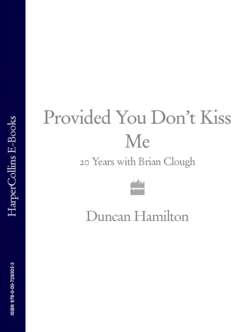Читать книгу Provided You Don’t Kiss Me: 20 Years with Brian Clough - Duncan Hamilton, Duncan Hamilton, Jonny Bairstow - Страница 9
ОглавлениеCHAPTER THREE
What a wast
Like a blind man feeling for a line of Braille, Peter Taylor ran his thick fingers along the underside of his desk. Silently, he got down on his knees and twisted his neck so he could see beneath it. He stood up stiffly and examined the phone on the desk, shaking it and staring blankly into the receiver, then placing it against his ear as if listening for something other than the low, persistent burr of the dialling tone. Slowly, he put the phone back on its cradle and, hands on hips, stood statue-still, the only movement a swivelling of the eyes across the length of his shadowy office.
‘Can’t be too careful at the moment,’ he said at last, without looking at me. ‘There’s lots of listening going on, strange things happening. Some of what I’ve said has been repeated to me by people who couldn’t have heard it. I’ve seen quotes from phone conversations I’ve had published in newspapers.’ His voice sounded agitated. He turned and tapped the wall behind him with his knuckles, as though he might find a secret passage there.
It was a late afternoon in January 1982, and the light was beginning to fade quickly. Taylor had rung me at the office and asked me to come and see him without delay because of ‘something I want to discuss with you – and I don’t want to do it on the phone’. He had spoken with an impatient briskness. I put the phone down and tried to think about what I’d written over the previous few days that might have upset him. I went to the untidy heap of back issues that lay in the corner of the sports department and began flicking through them. There wasn’t any piece with my by-line that I couldn’t legitimately defend: nothing I’d written seemed unfair or harsh. I nevertheless expected to be met with a hailstorm of criticism, and I steeled myself for it. Taylor had been particularly touchy of late, as if he had a permanent headache. In some ways, I suppose he had.
It had been a season of personal torment and, as it transpired, Taylor was then less than four months away from admitting that stress, the cumulative pressures of striving to maintain Nottingham Forest’s handsome record, both domestically and in Europe, had shredded his nerves to such an extent that he could no longer function. Everything that season had gone wrong, for him and for Forest.
When he ushered me into his office and began his strange routine, I began to wonder whether I was being teased or set up for an elaborate practical joke. But when I looked into Taylor’s vacant eyes, I realised he was serious. He was genuinely distressed about something.
Forest were on their way to finishing a miserable twelfth in the League and had been abjectly knocked out of the FA Cup by Wrexham, a Third Division side. There was creeping unease at the casual way in which the European Cup winning side of 1979 and 1980 was being slowly but steadily dismantled. And Forest had bought Justin Fashanu from Norwich for £1 million – the worst deal of Clough and Taylor’s managerial career. Trevor Francis was sold to pay for him.
Taylor had once been the Midas of football’s transfer market, and now, unfathomably, whatever he touched turned to lead. Forest were in acute financial difficulties. The club was guilty of overambition in grandly rebuilding the East Stand at the very time it needed to reconstruct and strengthen its team.
Worse, Clough fell ill over Christmas – a suspected heart attack – and found himself in the coronary unit of Derby Royal Infirmary. For just over three weeks, Taylor took on the entire management burden, and began to collapse under it.
During that bleak season, and the one before it, the atmosphere between manager and assistant had turned sulphurous. The relationship became a feud, a perpetual arm-wrestling competition over pride and principles. At the very beginning of the last nine months of the partnership, Taylor developed a curious but helpful habit of phoning me at home after matches. The call would come either as soon as Match of Day’s closing music began on Saturday night or sometime on Sunday morning. If it was Sunday morning, he would ring from a phone box – I could hear the coins jingling in his hands. Sometimes the pips went in mid-flow; he didn’t call back.
